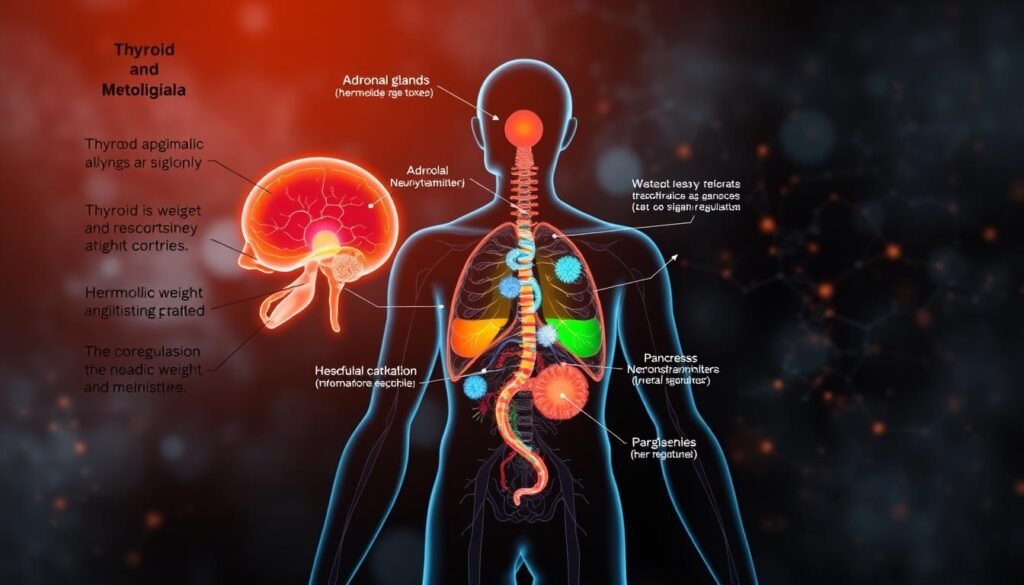Have you ever wondered if it’s truly possible to maintain weight loss over time? It’s a question many of us ask ourselves, especially when traditional methods like diet and exercise don’t always deliver the results we hope for. With 40% of adults in the United States facing obesity, this challenge is more common than you might think1.
Recent studies suggest that factors like industrial chemicals and genetic predispositions can complicate the process of losing weight. For example, individuals with certain differences in the FTO gene have a 20% to 30% higher chance of obesity1. This makes the journey even more complex.
In this article, I’ll explore the science behind weight loss, the role of environmental factors, and unconventional strategies that might help. Cutting 500 to 1,000 calories per day can lead to a weight loss of 1 to 2 pounds per week, but is that enough for long-term success1? Let’s dive in and find out.
Key Takeaways
- Obesity affects 40% of adults in the U.S., making it a widespread issue1.
- Genetic factors, like the FTO gene, can increase the risk of obesity1.
- Cutting calories and regular exercise are effective for short-term weight loss1.
- Environmental factors, such as industrial chemicals, may hinder progress.
- Unconventional strategies might be necessary for lasting results.
Understanding the Weight Conundrum
Weight loss isn’t just about willpower; it’s a multifaceted challenge. My own journey with obesity and low energy levels has taught me that there’s no one-size-fits-all solution. For years, I struggled to find the right balance, often feeling like I was fighting an uphill battle.
My Personal Struggle with Obesity and Energy
I remember a time when I felt trapped in a cycle of exhaustion and weight gain. No matter how much I exercised or restricted my diet, the scale wouldn’t budge. It wasn’t until I started looking beyond the surface that I realized the deeper issues at play.
Environmental toxins, often referred to as “forever chemicals,” can disrupt cellular respiration and metabolism. These chemicals, found in everyday products, have been linked to hormonal imbalances that drive weight gain2. Understanding this was a turning point in my journey.
Key Factors Influencing Weight Gain
Weight gain is influenced by a combination of factors, including genetics, lifestyle, and environment. Hormonal imbalances, such as those caused by thyroid issues, can make it harder to lose weight. Additionally, our modern diet, filled with processed foods, often leads to overeating and poor nutrient absorption.
Here’s a breakdown of the key factors:
| Factor | Impact |
|---|---|
| Environmental Toxins | Disrupt metabolism and hormone balance2 |
| Hormonal Imbalances | Affect energy levels and weight regulation |
| Dietary Habits | Processed foods contribute to overeating and nutrient deficiencies |
| Lifestyle Choices | Lack of sleep and stress can hinder weight loss efforts |
Understanding these factors is critical. As one expert put it,
“Weight loss isn’t just about eating less and moving more; it’s about addressing the root causes of imbalance.”
My experience has shown me that traditional methods like calorie counting and cardio alone often fall short. Instead, a holistic approach that considers hormonal health, environmental factors, and personal habits is essential for lasting results.
Strategies to Avoid Being Fat Forever
What if the idea of being stuck with extra weight is more myth than reality? Many believe that once you gain weight, it’s nearly impossible to lose it for good. However, research suggests that this belief might be holding us back from finding real solutions.

Studies show that only 1% of people with obesity maintain lasting weight loss using conventional methods like diet and exercise3. This statistic highlights the need for a more nuanced approach. Generic advice like “eat less and move more” often fails to address the unique factors influencing weight gain.
Redefining Weight Loss
Weight loss isn’t just about cutting calories or hitting the gym. It’s a complex process influenced by genetics, hormones, and lifestyle. For example, hormonal imbalances can make it harder to lose weight, even with strict dieting4. Understanding these factors is key to finding strategies that work.
Here’s why traditional methods fall short:
- They don’t account for individual differences in metabolism and genetics.
- They often ignore the role of environmental factors, like exposure to toxins.
- They focus on short-term results rather than long-term habits.
“Weight loss isn’t a one-size-fits-all journey. It’s about finding what works for your body and sticking with it.”
By shifting our mindset and exploring alternative methods, we can increase our chances of success. For instance, combining aerobic exercise with resistance training has been shown to lower body fat percentage more effectively than cardio alone5. This approach addresses both fat loss and muscle retention, leading to better long-term results.
Ultimately, the key to avoiding weight regain lies in personalized strategies. Whether it’s adjusting your diet, incorporating strength training, or addressing hormonal imbalances, there’s no single solution. But by redefining our understanding of weight loss, we can break free from the cycle and achieve lasting change.
Diet and Exercise: The Foundation of Weight Loss
When it comes to weight loss, diet and exercise are often seen as the cornerstone of success. While these methods are fundamental, they need to be tailored to individual needs to be truly effective. In my experience, finding the right balance between what I eat and how I move has been key to achieving lasting results.

Optimizing Your Diet for Lasting Change
Creating a calorie deficit is essential for weight loss, but it’s equally important to ensure your body gets the nutrients it needs. National guidelines recommend reducing calorie intake by about 600 calories per day for sustainable results6. This approach can lead to a weekly loss of approximately 1 pound.
I’ve tried various diets, from low-carb to intermittent fasting. While some worked temporarily, they often left me feeling tired and hungry. A balanced diet, rich in whole foods, has been the most effective for me. Regular meals and appropriate portion sizes are critical components of a healthy weight loss strategy6.
Here’s a quick breakdown of what works:
| Diet Strategy | Benefit |
|---|---|
| Balanced Macronutrients | Sustains energy and prevents overeating |
| Whole Foods | Provides essential nutrients for overall health |
| Regular Meals | Helps maintain stable blood sugar levels |
Incorporating Effective Exercise Routines
Exercise is just as important as diet. The recommended amount of moderate aerobic activity is at least 150 minutes per week7. I’ve found that combining aerobic exercise with strength training yields the best results. Strength training helps preserve muscle mass, which is crucial for maintaining a healthy metabolism.
Here are some tips to make exercise work for you:
- Start small: Begin with 20-30 minutes of activity and gradually increase.
- Mix it up: Alternate between cardio, strength training, and flexibility exercises.
- Stay consistent: Regular activity is more effective than sporadic intense workouts.
As one expert put it,
“Exercise isn’t just about burning calories; it’s about building a healthier body and mind.”
By optimizing your diet and incorporating effective exercise routines, you can create a sustainable plan for weight loss. Remember, it’s not about quick fixes but about making lasting changes that work for your body.
Hormonal and Metabolic Influences on Weight
Understanding how hormones and metabolism affect weight can be a game-changer in your health journey. For years, I struggled to lose weight despite following strict diets and exercise routines. It wasn’t until I addressed my hormonal imbalances that I began to see real results.

The Role of Thyroid and Hormone Balance
The thyroid gland plays a central role in regulating metabolism. Thyroid hormones, particularly T3, help maintain a healthy resting metabolic rate8. When my thyroid was underactive, I experienced low energy and weight gain, even when I was eating well.
Standard medical treatments often focus on TSH levels, but they may not address underlying hormonal deficiencies. For example, leptin resistance, a condition where the body doesn’t respond to the hormone leptin, can lead to chronic weight gain8. This was a key factor in my struggle.
Understanding Metabolic Challenges in Weight Loss
Metabolic challenges can make losing weight feel like an uphill battle. Hormonal imbalances in insulin, leptin, and other systems can disrupt your body’s ability to burn calories efficiently8. These imbalances often go unnoticed but can have a significant impact on your weight.
Research shows that proper hormone management can lead to spontaneous weight loss, even without strict dieting8. For me, advocating for better thyroid care and personalized hormone therapy was a turning point. If you suspect metabolic issues, consider getting comprehensive lab panels to identify the root cause.
“Weight loss isn’t just about calories in and calories out; it’s about understanding your body’s unique hormonal system.”
By addressing hormonal and metabolic challenges, you can create a more effective weight loss strategy. It’s not just about eating less or moving more—it’s about giving your body the support it needs to function optimally.
Environmental and Lifestyle Factors Impacting Weight
Environmental and lifestyle factors play a significant role in weight management, often overlooked in traditional approaches. From the chemicals in our homes to the habits we form daily, these elements can either support or hinder our health goals. Understanding their impact is key to creating lasting change.

Impact of Forever Chemicals on Our Bodies
Industrial chemicals, often called “forever chemicals,” have a profound effect on our metabolism. These substances, like PFOS, disrupt cellular respiration and confuse receptors and enzymes in our bodies9. This interference can lead to hormonal imbalances, making it harder to maintain a healthy weight.
Research shows that over 50 chemicals have been identified as potential obesogens, influencing fat storage and weight gain9. Reducing exposure to these toxins is a critical step in supporting your body’s natural processes.
Adapting Your Lifestyle for Better Health
Small lifestyle changes can make a big difference. Start by choosing whole foods over processed options. This simple switch reduces chemical exposure and provides essential nutrients for energy9.
Regular physical activity is another powerful tool. Studies show that combining aerobic exercise with strength training can lower body fat percentage more effectively than cardio alone9. Consistency is key—find activities you enjoy and make them part of your routine.
Creating an Environment That Supports Change
Your surroundings play a crucial role in your health journey. Remove temptations by keeping unhealthy snacks out of sight. Instead, stock your kitchen with fresh fruits, vegetables, and other nutrient-rich foods.
At work, take short breaks to stretch or walk. These small adjustments can improve focus and reduce stress, which is linked to weight gain9. As one expert noted,
“A supportive environment is the foundation of sustainable health habits.”
By addressing environmental and lifestyle factors, you can create a holistic approach to weight management. It’s not just about what you eat or how you move—it’s about building a life that supports your goals.
My Journey Through Failed Diets and Sustainable Change
My journey with weight loss has been a rollercoaster of trial and error. Like many, I’ve tried countless diets, only to see short-term wins quickly reverse. Over the years, I’ve learned that conventional methods often fall short, leaving me frustrated and back at square one.

Statistics show that over 50% of lost weight is regained within two years, and by five years, more than 80% is regained10. This data reflects my own experience—diets worked temporarily, but they weren’t sustainable. It wasn’t until I shifted my mindset that I began to see lasting results.
Lessons Learned from Conventional Weight Loss Methods
Traditional diets often focus on quick fixes, like cutting calories or eliminating certain foods. While these methods can lead to initial weight loss, they rarely address the root causes of weight gain. For me, the cycle of losing and regaining weight became a pattern I couldn’t break.
Research shows that prevention of weight regain requires about 300–500 kcal/d of increased persistent effort to counteract the slowing metabolism and increased appetite associated with weight loss10. This was a game-changer for me. I realized that sustainable weight loss isn’t just about what you eat—it’s about how you live.
Adopting a New Mindset for Long-Term Success
Shifting my mindset was the turning point in my journey. Instead of focusing on quick results, I embraced a holistic approach that included diet, exercise, and mental resilience. This change allowed me to view setbacks as learning opportunities rather than failures.
As one expert noted,
“Sustainable weight loss is about creating habits that support your goals, not just following a temporary plan.”
This quote resonated with me. By incorporating small, consistent changes into my daily routine, I was able to achieve lasting results.
Today, I encourage others to view their health journey as a marathon, not a sprint. It’s about finding what works for you and sticking with it, even when challenges arise. With the right mindset, sustainable change is possible.
Conclusion
Achieving lasting weight loss is a journey that requires more than just willpower. It’s about understanding the unique factors that influence your body, from hormonal imbalances to environmental toxins11. Traditional methods often fall short because they don’t address these complexities.
Personalized approaches make a significant difference. By focusing on your individual needs, you can create a plan that works for you. This might include adjusting your diet, incorporating strength training, or addressing hormonal issues12.
Persistence is key. Studies show that maintaining weight loss requires ongoing effort, but the results are worth it13. Remember, it’s not about quick fixes but about making sustainable changes.
I encourage you to reflect on your own journey and consider the strategies discussed. With the right approach, it’s possible to achieve and sustain a healthy weight. If you need further support, don’t hesitate to seek it. Your health is worth the effort.
FAQ
Is it possible to not be fat forever?
What are the key factors influencing weight gain?
How can I optimize my diet for lasting weight loss?
What types of exercise are most effective for weight loss?
How do hormones and metabolism affect weight?
Can environmental factors impact my weight?
What lessons have you learned from failed diets?
Source Links
- https://www.webmd.com/obesity/features/are-you-fated-be-fat
- https://neurotypetraining.com/the-calorie-counting-conundrum/
- https://www.hopkinsmedicine.org/health/wellness-and-prevention/maintaining-weight-loss
- https://www.helpguide.org/wellness/weight-loss/how-to-lose-weight-and-keep-it-off
- https://www.healthline.com/nutrition/best-ways-to-burn-fat
- https://www.bbcgoodfood.com/health/weight-loss/how-lose-weight-and-keep-it
- https://www.mayoclinic.org/healthy-lifestyle/weight-loss/in-depth/weight-loss-plateau/art-20044615
- https://pmc.ncbi.nlm.nih.gov/articles/PMC3174765/
- https://pmc.ncbi.nlm.nih.gov/articles/PMC6559802/
- https://pmc.ncbi.nlm.nih.gov/articles/PMC5764193/
- https://www.restartmed.com/destined-to-be-overweight-forever/?srsltid=AfmBOoopgixjI7hMTjBZSvU19XLfNb5PkHWUcxTdqKDTmtfkqBhzD171
- https://www.mybotoxla.com/blog/zerona-vs-coolsculpting-what-treatment-gets-rid-of-fat-forever
- https://triagemethod.com/how-to-lose-fat-and-keep-it-off-forever/






